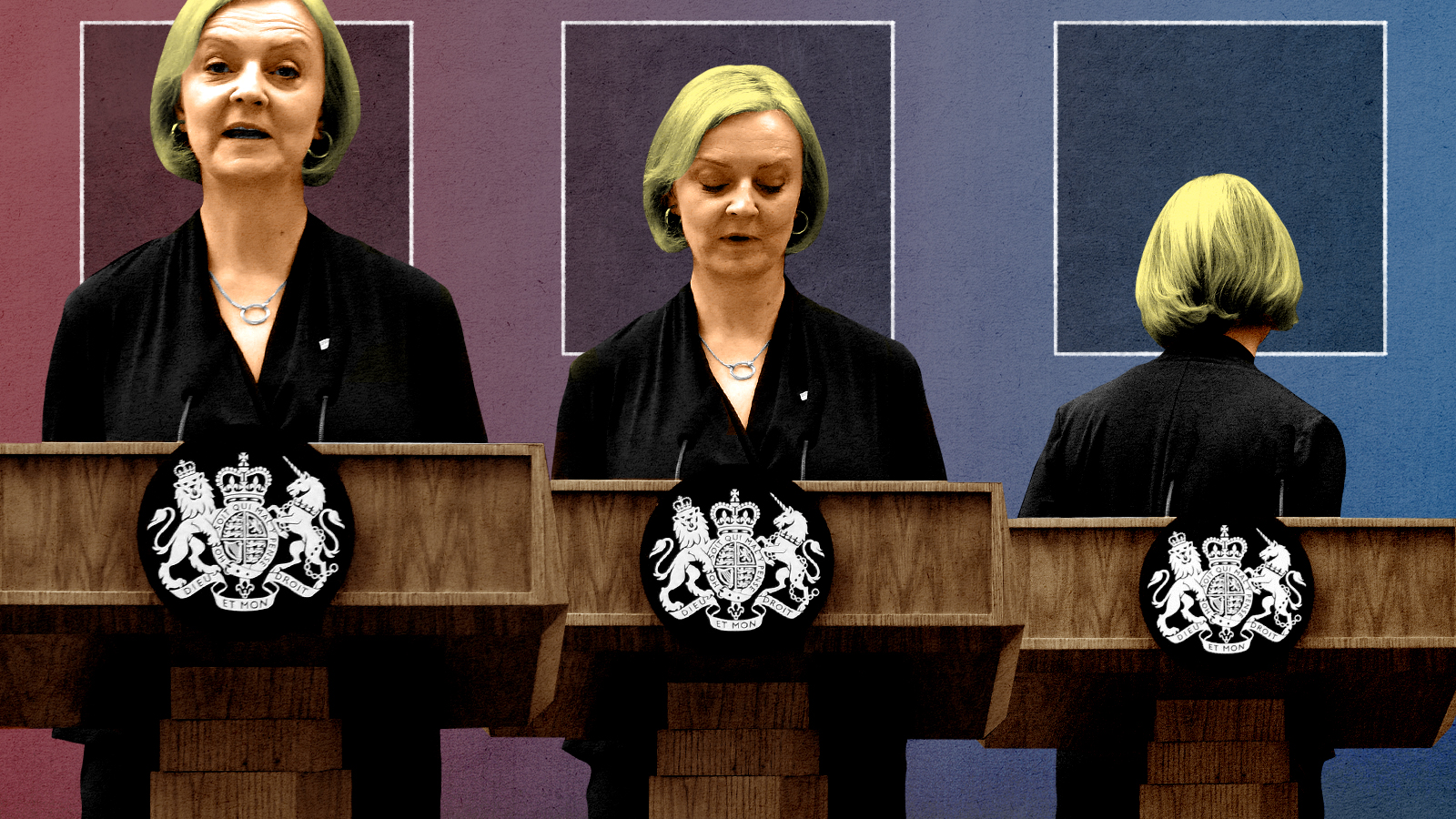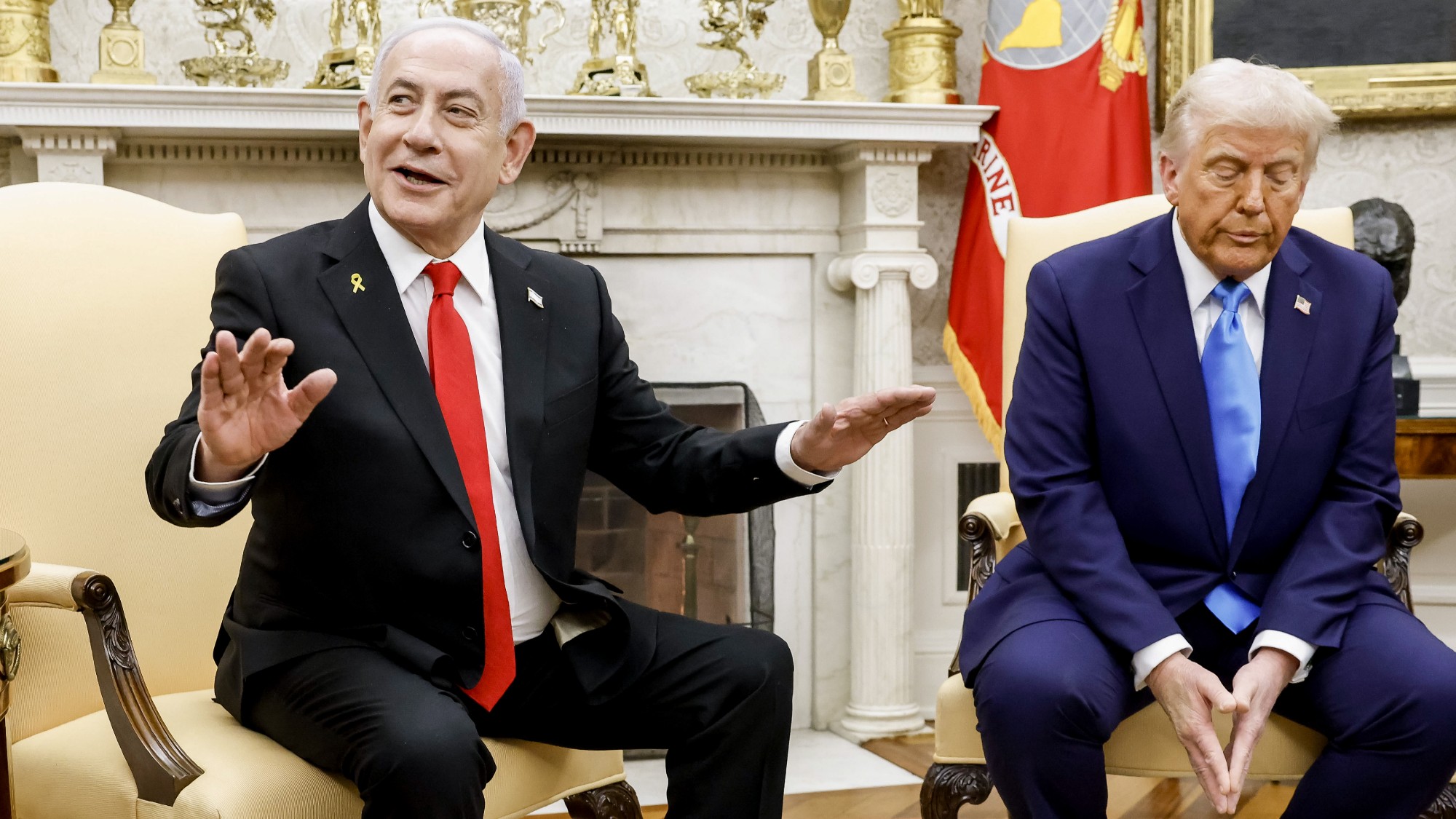The resignation of Liz Truss, explained
The rise — and very quick fall — of the U.K. prime minister


Liz Truss has resigned as the prime minister of the United Kingdom. Here's everything you need to know:
The latest:
Truss resigned from her post as prime minister of the U.K. less than two months after taking over from Boris Johnson, her disgraced fellow Conservative Party member. It was an incredibly brief tenure. "Liz Truss has been in office for just 45 days — the shortest tenure of any U.K. prime minister," the BBC reports. Previously, the kingdom's record for shortest-serving prime minister was held by George Canning, who held power for just 119 days before dying of tuberculosis.
Truss, of course, didn't die — but she also quickly found out that she couldn't get the job of leading Great Britain through the post-pandemic, post-Brexit era while a war in Europe is disrupting energy prices. "I cannot deliver the mandate on which I was elected," she said in her resignation remarks. Her fall had been widely predicted: "Ms. Truss's political viability had become tenuous after her proposals for broad unfunded tax cuts roiled markets and sent the pound's value plunging," the New York Times observes.
Subscribe to The Week
Escape your echo chamber. Get the facts behind the news, plus analysis from multiple perspectives.

Sign up for The Week's Free Newsletters
From our morning news briefing to a weekly Good News Newsletter, get the best of The Week delivered directly to your inbox.
From our morning news briefing to a weekly Good News Newsletter, get the best of The Week delivered directly to your inbox.
Did Truss ever really have a chance?
Possibly not. When she took over the prime ministership from the disgraced Boris Johnson on Sept. 6, 2022, there were already plenty of doubters. "A consensus has settled that Britain's new Prime Minister Liz Truss is done for before she even begins," James Johnson wrote for Politico in early September. With the United Kingdom's economy beset by skyrocketing inflation, due in large part to an energy crisis caused by Russia's invasion of Ukraine, a new Conservative PM was probably always going to have a short leash. But, Johnson added, "changes of leadership matter, and Truss will get a new chance by default." The new prime minister didn't have her predecessor's media savvy — he was a former journalist, after all — but she won leadership on the notion that "she gets things done." That reputation quickly took a major hit.
So what caused her downfall?
Soon after she took office — everything is "soon" in this story — Truss and her Treasury chief Kwasi Kwarteng announced a "mini budget" that included a big tax cut on top earners and large amounts of deficit spending by the government. "Rarely has a budget caused such political and economic damage," The Guardian reports. The value of the British pound plunged following the announcement, the Bank of England intervened to prop up the value, and after 10 days, Kwarteng announced that the tax cut plan was being scrapped. The political damage had been done: Truss fired Kwarteng last week.
One thing to note: The plan to cut taxes was one plank of a broader plan that also included big government spending to cap household rises in energy bills caused by the Russian war. And the British economy has also been sluggish in recent years, slammed by the one-two punch of the COVID pandemic and a loss of trade following Brexit. The tax cut proposal, then, was designed to jump-start the economy — a "bold but risky gamble that the payoff from higher growth will more than offset the risks from a big expansion in the government's deficit and debt at a time of high inflation and rising interest rates," The Wall Street Journal reported.
Why did her economic plans cause a backlash?
There are two major reasons. The first is that the markets obviously didn't like it: See again that plunging pound. But the tax cuts also didn't go over well with ordinary Brits, who are already suffering under the burden of inflation. The plunging pound stood to make "everyday products in Britain more expensive as importers face spiraling costs," NBC noted. Plus, an expected hike in interest rates — to help control inflation — is expected to inflate the costs of mortgages for British homeowners. Under Truss' tax plan, though, "the country's wealthiest households [stood] to make huge gains," CNN reported last week, with features that gave "workers making more than $1 million a year a roughly $58,000 tax cut." That led to widespread criticism that Conservatives were relying on the "trickle-down economics" of the Reagan-Thatcher years to get the country's economy growing again.
How hard were Conservatives hit in the polls?
Badly. "Liz Truss's personal popularity ratings are lower than those of Boris Johnson when his premiership came to an end," The Guardian reported on Oct. 1. Just 18 percent of Brits approved of her performance in that Opinium poll, while 55 percent disapproved — putting her underwater by an astounding 37 points. Johnson, meanwhile, was down 28 points when he left office.
What brought about her final downfall?
The last 24 hours before Truss' resignation were increasingly frenzied. "Lawmakers' anger grew after a Wednesday evening vote over fracking for shale gas — a practice that Truss wants to resume despite opposition from many Conservatives — produced chaotic scenes in Parliament," The Associated Press reports. There were rumors that party whips had resigned over the vote, although Truss said they remained in their posts. But Home Secretary Suella Braverman did resign on Wednesday, and after that, the writing was on the wall for Truss.
What's next?
Big changes, possibly. The Conservative Party is expected to name a new leader within the week, and Boris Johnson might be primed to make a return to the prime ministership. But it's possible that that is just the beginning. Keir Starmer, leader of the opposition Labour Party, has called for an immediate general election: "The Conservative party has shown it no longer has a mandate to govern," he said on Thursday. Conservatives have controlled the government since 2010 — around the time of the last major world financial crisis — but the Labour Party seems primed for a comeback.
There is a real question of whether Great Britain is governable. "Before Brexit, Britain had four prime ministers over 31 years," NBC's Sahil Kapur noted on Twitter. "Since Brexit, Britain has had four prime ministers over seven (7) years." Whoever leads next has a big challenge ahead of them — but they'll probably last longer in the job than Liz Truss.
A free daily email with the biggest news stories of the day – and the best features from TheWeek.com
Joel Mathis is a writer with 30 years of newspaper and online journalism experience. His work also regularly appears in National Geographic and The Kansas City Star. His awards include best online commentary at the Online News Association and (twice) at the City and Regional Magazine Association.
-
 One year after mass protests, why are Kenyans taking to the streets again?
One year after mass protests, why are Kenyans taking to the streets again?today's big question More than 60 protesters died during demonstrations in 2024
-
 North Korea's army of fake IT workers
North Korea's army of fake IT workersThe Explainer Using AI and stolen information to craft false identities, they are becoming an 'increasing menace' to top tech companies in the US and UK
-
 Israel-US 'rift': is Trump losing patience with Netanyahu?
Israel-US 'rift': is Trump losing patience with Netanyahu?Today's Big Question US president called for an end to Gaza war and negotiated directly with Hamas to return American hostage, amid rumours of strained relations
-
 What happens if tensions between India and Pakistan boil over?
What happens if tensions between India and Pakistan boil over?TODAY'S BIG QUESTION As the two nuclear-armed neighbors rattle their sabers in the wake of a terrorist attack on the contested Kashmir region, experts worry that the worst might be yet to come
-
 Why Russia removed the Taliban's terrorist designation
Why Russia removed the Taliban's terrorist designationThe Explainer Russia had designated the Taliban as a terrorist group over 20 years ago
-
 Inside the Israel-Turkey geopolitical dance across Syria
Inside the Israel-Turkey geopolitical dance across SyriaTHE EXPLAINER As Syria struggles in the wake of the Assad regime's collapse, its neighbors are carefully coordinating to avoid potential military confrontations
-
 'Like a sound from hell': Serbia and sonic weapons
'Like a sound from hell': Serbia and sonic weaponsThe Explainer Half a million people sign petition alleging Serbian police used an illegal 'sound cannon' to disrupt anti-government protests
-
 The arrest of the Philippines' former president leaves the country's drug war in disarray
The arrest of the Philippines' former president leaves the country's drug war in disarrayIn the Spotlight Rodrigo Duterte was arrested by the ICC earlier this month



